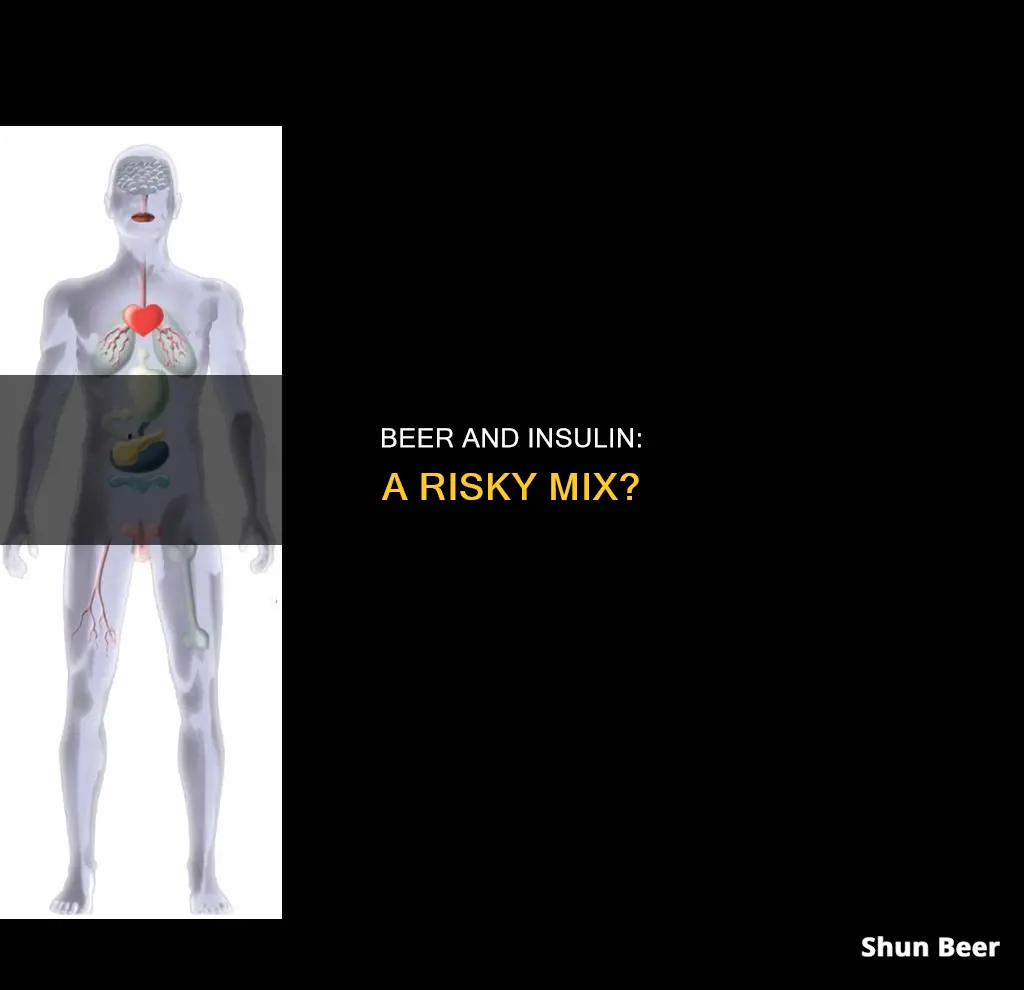
Drinking alcohol while managing diabetes with insulin is a complex issue that requires an individualized approach. While beer and other alcoholic beverages are not necessarily off-limits for people with diabetes, it is crucial to understand the potential risks and safety considerations. Excessive alcohol consumption can lead to a drop in blood sugar levels, increasing the risk of hypoglycemia, especially when combined with insulin and certain diabetes medications. This can be dangerous as the symptoms of hypoglycemia can be similar to those of alcohol intoxication, making it challenging to distinguish between the two. Therefore, it is essential to monitor blood sugar levels closely and follow guidelines such as drinking in moderation, avoiding drinking on an empty stomach, and consulting with a healthcare provider for personalized advice.
| Characteristics | Values |
|---|---|
| Alcohol's effect on blood sugar | Alcohol can cause blood sugar levels to drop, increasing the risk of hypoglycemia. |
| Alcohol's interaction with insulin | Alcohol does not directly interact with insulin. |
| Safe alcohol consumption guidelines for diabetics | Never drink on an empty stomach, monitor blood sugar levels, choose drinks wisely, and drink slowly. |
| Alcohol consumption recommendations | No more than one drink a day for women and up to two drinks a day for men. |
| Beer's carb content | Beer is typically higher in carbs than other alcoholic drinks like wine or liquor. |
What You'll Learn

Alcohol can cause hypoglycemia
The symptoms of hypoglycemia include:
- Lightheadedness or dizziness
- Confusion
- Irritability
- Headache
- Fatigue
- Hunger
- Sweating
- An irregular heartbeat
- Blurred vision
- Seizures
- Loss of consciousness
These symptoms are similar to those of drunkenness, making it challenging to tell if someone is hypoglycemic or intoxicated.
People with diabetes need to be particularly aware of the effects of alcohol on blood sugar levels. Alcohol can cause hypoglycemia more easily in people with diabetes, especially when mixed with diabetes medications such as insulin and sulfonylureas.
Additionally, people with diabetes should be aware that alcohol can also raise the risk of diabetes complications such as eye problems, vision loss, heart disease, and strokes.
Beer and Surgery: A Dangerous Mix?
You may want to see also

Alcohol interferes with the liver's ability to regulate blood sugar
Alcohol can interfere with the liver's ability to regulate blood sugar levels. The liver is responsible for detoxifying the body of alcohol, and when it is busy breaking down alcohol, it may not release enough glucose to keep blood sugar levels high. This is especially true for people who take insulin or medications that increase insulin production, as insulin lowers blood sugar levels.
Alcohol affects the liver's ability to regulate blood sugar by inhibiting the liver's ability to produce and release glucose. Alcohol is broken down by the liver, and this process takes priority over the liver's other functions, including glucose production. As a result, the liver may not produce enough glucose to maintain healthy blood sugar levels, especially in people with diabetes.
Additionally, alcohol can interfere with the hormones that regulate blood sugar levels. It can also decrease insulin sensitivity, further impacting the body's ability to regulate blood sugar effectively.
The effects of alcohol on blood sugar levels can last for several hours after drinking, and people with diabetes are at an increased risk of experiencing hypoglycemia (low blood sugar) after consuming alcohol. It is important for people with diabetes to monitor their blood sugar levels before, during, and after drinking alcohol to avoid dangerous drops in blood sugar.
While alcohol can interfere with the liver's ability to regulate blood sugar, it is important to note that moderate alcohol consumption has been associated with a reduced risk of type 2 diabetes in some studies. However, excessive alcohol consumption can increase the risk of developing type 2 diabetes and other metabolic disorders.
Drinking Beer on Chicago Streets: What's the Law?
You may want to see also

Alcohol can mask the symptoms of hypoglycemia
People with diabetes who have been drinking alcohol may not recognise the warning signs of hypoglycemia, such as sweating, weakness, shakiness, nervousness, and a pounding or racing heart. This is known as hypoglycemic unawareness. Alcohol can also impair the body's ability to recover from hypoglycemia, as it reduces the growth hormone and cortisol responses that are part of the body's counter-regulatory response to hypoglycemia.
The combination of alcohol-induced hypoglycemia, hypoglycemic unawareness, and delayed recovery from hypoglycemia can lead to serious health consequences, including incontinence, inability to follow simple commands, perseveration, disorientation, and impairment of recent memory. In some cases, these changes can be permanent, and hypoglycemia-induced neurological changes can even lead to death.
To avoid alcohol-related hypoglycemia, people with diabetes should only consume alcohol with or shortly after meals. It is also important to regularly monitor blood glucose levels when drinking, and to be careful when injecting insulin while under the influence of alcohol, as it is easy to inject too much.
Beer and Gout: What You Need to Know
You may want to see also

Alcohol can affect the effectiveness of diabetes medication
Furthermore, intoxication can mask the symptoms of hypoglycaemia, making it difficult to distinguish between low blood sugar and drunkenness. This is dangerous as it can delay treatment and lead to life-threatening conditions. Therefore, it is important for individuals with diabetes to monitor their blood sugar levels and follow safety guidelines when consuming alcohol. These guidelines include never drinking on an empty stomach, choosing drinks wisely, and drinking slowly.
Beer and Fatigue: Is Your Daily Drink Making You Tired?
You may want to see also

Alcohol can cause weight gain
Secondly, alcohol can make you feel hungrier. Some studies suggest that alcohol affects the hormones that control appetite, hunger, and stress, such as cortisol. It can also lower your blood sugar, which may increase your hunger.
Thirdly, alcohol stops your body from burning fat. When you drink alcohol, your liver prioritizes breaking down alcohol over fat. This can lead to an increase in abdominal fat, which is linked to various health complications.
Finally, alcohol can lead to cravings for salty and greasy foods, further contributing to weight gain.
However, it is important to note that the relationship between alcohol consumption and weight gain is complex, and other factors such as diet, physical activity, and overall health also play a role. Additionally, light-to-moderate alcohol consumption has not been found to cause weight gain.
Bob Marley's Relationship with Beer Explored
You may want to see also







